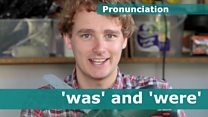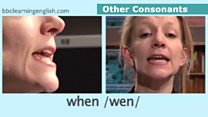Unit 12: Towards Advanced
Grammar, news, vocabulary and pronunciation
Select a unit
- 1 Towards advanced
- 2 Towards advanced
- 3 Towards advanced
- 4 Towards advanced
- 5 Towards advanced
- 6 Towards advanced
- 7 Towards advanced
- 8 Towards advanced
- 9 Towards Advanced
- 10 Towards Advanced
- 11 Towards Advanced
- 12 Towards Advanced
- 13 Towards Advanced
- 14 Towards Advanced
- 15 Towards Advanced
- 16 Towards Advanced
- 17 Towards Advanced
- 18 Towards Advanced
- 19 Towards Advanced
- 20 Towards Advanced
- 21 Towards Advanced
- 22 Towards Advanced
- 23 Towards Advanced
- 24 Towards Advanced
- 25 Towards Advanced
- 26 Towards Advanced
- 27 Towards Advanced
- 28 Towards Advanced
- 29 Towards Advanced
- 30 Towards Advanced
Session 5
Tim's Pronunciation Workshop: pronouncing 'and'
How do fluent speakers of English pronounce the word 'and' in natural speech? Tim explains...
Activity 1
Tim's Pronunciation Workshop: 'and'
Fish and chips...
Tim's back in his pronunciation workshop. This time he's finding out how English speakers sometimes pronounce the word 'and' - and he's giving the people of London a special test.
To do
Take a look at the video, then try the activity to do some practice.
Watch the video and complete the activity

Tim
Hi. I'm Tim and this is my Pronunciation Workshop. Here, I'm going to show you how English is really spoken. Come on, let's go inside. Hey, look at this: a present. All wrapped up in paper. Now, do you know what this is? Well, if you could smell it, it might give you a clue.
Voice
Is it your old socks?
Tim
Very funny – No. No, it's not my old socks. It's something much, much nicer. Something delicious in fact. Let's ask the people of London if they can tell what it is, without seeing it.
Voxpops
Fish and chips.
Fish and chips.
Fish and chips.
Fish and chips.
Fish and chips.
Tim
Yes, that's right. It's good old fish and chips. I'm going to save that for later. Now the word and has got three sounds, hasn't it? /æ/, /n/, /d/ - but listen again. How is it pronounced in everyday speech?
Voxpops
Fish and chips.
Fish and chips.
Fish and chips.
Fish and chips.
Fish and chips.
Tim
And is not usually an important word. It’s a basic conjunction and it's frequently unstressed. When this happens, the /d/ at the end of the word disappears before both vowels and consonants, and the vowel sound at the beginning of the word changes to schwa: /ə/, so and becomes /ən/ or even /n/ as the sounds are almost identical. Here are some more examples.
Examples
I'm going to go and get the shopping.
Apples and oranges are my favourite fruits.
I’ve been thinking and thinking but I can't decide.
We went for a coffee and something to eat.
Tim
Right, so you've heard the examples, and now it's your turn. You know the drill. Listen and repeat.
Examples
I'm going to go and get the shopping.
Apples and oranges are my favourite fruits.
I’ve been thinking and thinking but I can't decide.
We went for a coffee and something to eat.
Tim
Great work. Remember, if you want to learn more about pronunciation, then please visit our website, bbclearningenglish dot com. And that is about it from the Pronunciation Workshop for now. I'll see you next week. Bye! Now, there's only one thing to eat with fish 'n' chips – and that's salt ‘n’ vinegar. This reminds me of one of my favourite jokes: What do angry sharks eat? Fish ‘n’ ships. Get it? Fish ‘n’ ships! Oh, I don't know why I bother. Ok, now, time to eat. What? What is this? What is going on? Where's the…? It really is fish… and ships! Well that is the last time I'm telling that joke. This is no laughing matter. I'm hungry now…
To do
Got that? Now try this activity to get some more practice.
The 'and' game
5 Questions
How many examples of 'and' pronounced /ən/ or /n/ are there in each sentence? You decide...
Help
Activity
How many examples of 'and' pronounced /ən/ or /n/ are there in each sentence? You decide...
Hint
When English speakers say the word ‘and’, it is frequently unstressed. The /d/ at the end disappears before both consonants and vowels and the vowel sound at the beginning becomes schwa: /ə/, so 'and' becomes /ən/ or often, just /n/.Question 1 of 5

Help
Activity
How many examples of 'and' pronounced /ən/ or /n/ are there in each sentence? You decide...
Hint
When English speakers say the word ‘and’, it is frequently unstressed. The /d/ at the end disappears before both consonants and vowels and the vowel sound at the beginning becomes schwa: /ə/, so 'and' becomes /ən/ or often, just /n/.Question 2 of 5

Help
Activity
How many examples of 'and' pronounced /ən/ or /n/ are there in each sentence? You decide...
Hint
When English speakers say the word ‘and’, it is frequently unstressed. The /d/ at the end disappears before both consonants and vowels and the vowel sound at the beginning becomes schwa: /ə/, so 'and' becomes /ən/ or often, just /n/..Question 3 of 5

Help
Activity
How many examples of 'and' pronounced /ən/ or /n/ are there in each sentence? You decide...
Hint
When English speakers say the word ‘and’, it is frequently unstressed. The /d/ at the end disappears before both consonants and vowels and the vowel sound at the beginning becomes schwa: /ə/, so 'and' becomes /ən/ or often, just /n/.Question 4 of 5

Help
Activity
How many examples of 'and' pronounced /ən/ or /n/ are there in each sentence? You decide...
Hint
When English speakers say the word ‘and’, it is frequently unstressed. The /d/ at the end disappears before both consonants and vowels and the vowel sound at the beginning becomes schwa: /ə/, so 'and' becomes /ən/ or often, just /n/.Question 5 of 5

Excellent! Great job! Bad luck! You scored:
End of Unit 12
We hope that was useful. In Unit 13, Dan brings you a Masterclass about common mistakes made by native speakers of English. In News Review and LingoHack you can find out which words are making the headlines - and Tim will be back with the pronunciation workshop as usual. See you there!
Session Vocabulary
Pronunciation of 'and'
The word and is frequently stressed in natural English. The /d/ at the end disappears before both consonants and vowels, and the vowel sound at the beginning becomes schwa: /ə/, so and becomes /ən/ or often, just /n/.Some examples of phrases where this might happen include:
- I love fish and chips.
- He bought apples and oranges.
- I’ll go and get the shopping.


